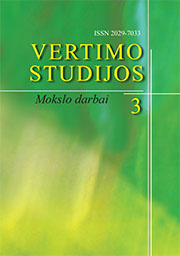APIE KEIKSMAŽODŽIŲ VERTIMĄ IŠ ITALŲ KALBOS Į LIETUVIŲ KALBĄ I. CALVINO ROMANO VORŲ LIZDŲ TAKAIS KEIKSMAŽODŽIŲ VERTIMO ANALIZĖ
ON THE TRANSLATION OF EXPLETIVES FROM ITALIAN INTO LITHUANIAN. ANALYSIS OF THE TRANSLATION OF EXPLETIVES IN ITALO CALVINO’S NOVEL IL SENTIERO DEI NIDI DI RAGNO
Author(s): Lina Spurgevičiūtė, Rasa KlioštoraitytėSubject(s): Comparative Linguistics, Other Language Literature, Translation Studies
Published by: Vilniaus Universiteto Leidykla
Keywords: Translation; expletives; Italian language; Lithuanian language;
Summary/Abstract: The article focuses on the problem of the translation of expletives. In particular, it examines Italian threats and expletives, their meaning and semantic force, the degree of vulgarity in the original and discusses problems of their translation into Lithuanian in an effort to establish the most common and appropriate techniques. All examples come from Italo Calvino’s novel Il sentiero dei nidi di ragno (‘The Path to the Nest of Spiders’) and its Lithuanian translation Vorų lizdų takais. The analysis of threats and expletives as used in the original of the novel and its Lithuanian translation leads to the conclusion that the most important aspects to be taken into account in translating expletives include the semantics of threats, the degree of insult, the contextual situation and the system of expletives in the target language. In the simplest case, the translation of expletives that have full semantic equivalents in the phraseology of Lithuanian enables the translator to ensure equivalence in translation. The most difficult cases are defined by an Italian expletive having no match in the vocabulary of Lithuanian expletives.
Journal: Vertimo studijos
- Issue Year: 3/2010
- Issue No: 3
- Page Range: 84-92
- Page Count: 9
- Language: Lithuanian

